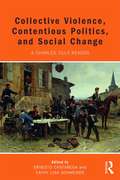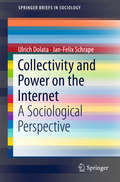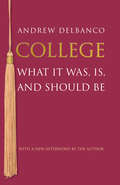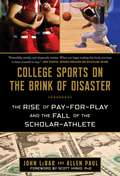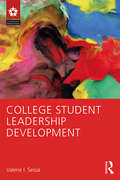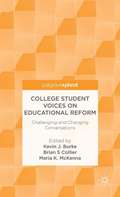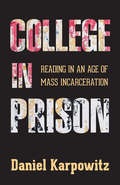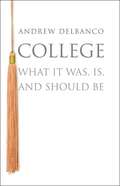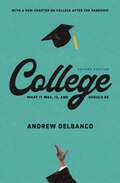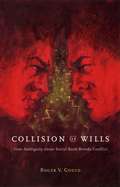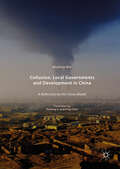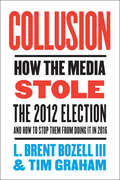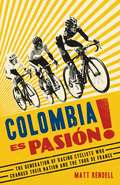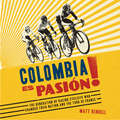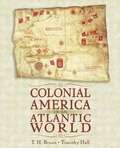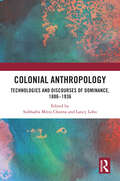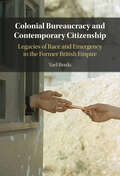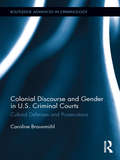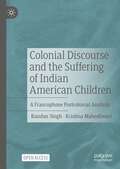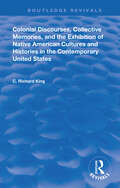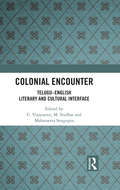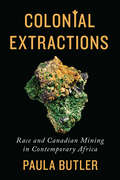- Table View
- List View
Collective Violence, Contentious Politics, and Social Change: A Charles Tilly Reader
by Charles Tilly Cathy Lisa Schneider Ernesto CastañedaCharles Tilly is among the most influential American sociologists of the last century. For the first time, his pathbreaking work on a wide array of topics is available in one comprehensive reader. This manageable and readable volume brings together many highlights of Tilly’s large and important oeuvre, covering his contribution to the following areas: revolutions and social change; war, state making, and organized crime; democratization; durable inequality; political violence; migration, race, and ethnicity; narratives and explanations. The book connects Tilly’s work on large-scale social processes such as nation-building and war to his work on micro processes such as racial and gender discrimination. It includes selections from some of Tilly’s earliest, influential, and out of print writings, including The Vendée; Coercion, Capital and European States; the classic "War Making and State Making as Organized Crime;" and his more recent and lesser-known work, including that on durable inequality, democracy, poverty, economic development, and migration. Together, the collection reveals Tilly’s complex, compelling, and distinctive vision and helps place the contentious politics approach Tilly pioneered with Sidney Tarrow and Doug McAdam into broader context. The editors abridge key texts and, in their introductory essay, situate them within Tilly’s larger opus and contemporary intellectual debates. The chapters serve as guideposts for those who wish to study his work in greater depth or use his methodology to examine the pressing issues of our time. Read together, they provide a road map of Tilly’s work and his contribution to the fields of sociology, political science, history, and international studies. This book belongs in the classroom and in the library of social scientists, political analysts, cultural critics, and activists.
Collectivity and Power on the Internet: A Sociological Perspective (Springerbriefs In Sociology)
by Ulrich Dolata Jan-Felix SchrapeThis book provides a comprehensive overview of the manifestations and interrelations of collectivity and power on the internet from a sociological point of view. It addresses questions on how different forms of internet-based collectivities (masses, crowds, movements, communities ) could be understood and differentiated from one another. It presents analyses on the role technical infrastructures of the web play for their formation, how the mobilization and organization of social movements and social protests has changed through social media, how work and decision-making processes are organized in open source communities and why the essential segments of the commercial internet are today concentrated in the hands of a few corporations who dispose over significant economic, infrastructural and rule-setting power.
College
by Andrew DelbancoAs the commercialization of American higher education accelerates, more and more students are coming to college with the narrow aim of obtaining a preprofessional credential. The traditional four-year college experience--an exploratory time for students to discover their passions and test ideas and values with the help of teachers and peers--is in danger of becoming a thing of the past. In College, prominent cultural critic Andrew Delbanco offers a trenchant defense of such an education, and warns that it is becoming a privilege reserved for the relatively rich. In arguing for what a true college education should be, he demonstrates why making it available to as many young people as possible remains central to America's democratic promise. In a brisk and vivid historical narrative, Delbanco explains how the idea of college arose in the colonial period from the Puritan idea of the gathered church, how it struggled to survive in the nineteenth century in the shadow of the new research universities, and how, in the twentieth century, it slowly opened its doors to women, minorities, and students from low-income families. He describes the unique strengths of America's colleges in our era of globalization and, while recognizing the growing centrality of science, technology, and vocational subjects in the curriculum, he mounts a vigorous defense of a broadly humanistic education for all. Acknowledging the serious financial, intellectual, and ethical challenges that all colleges face today, Delbanco considers what is at stake in the urgent effort to protect these venerable institutions for future generations. In a new preface, Delbanco addresses recent events that threaten the future of the institution.
College Sports on the Brink of Disaster: The Rise of Pay-for-Play and the Fall of the Scholar-Athlete
by Allen Paul John LeBarImpelled by runaway spending and rampant corruption, America's much-beloved games of college basketball and football are being threatened. The specter of billion-dollar sums being showered on coaches, voracious athletic directors, hordes of support staff and lavish comforts for fans has led to a near-deafening roar to pay the players. The injustice of such sums being amassed, in the main, from the labor of young men of color many of whom come from disadvantaged backgrounds cannot be justified; and yet, American society has allowed this intractable problem to fester for more than half a century. Lured by the glitter of untold riches, naive young players enroll year after year in colleges and universities expecting the ultimate reward of a highly paid career as a pro. Only a minuscule few will advance that far; even fewer will reap significant financial rewards. Instead of educating them, colleges and universities force them into full-time athletic jobs in which their labor is shamelessly exploited. Small wonder that outraged critics demand compensation for the players, but these same critics only present vague answers when asked how such a radical change would work. College Sports on the Brink of Disaster, first published as Marching Toward Madness and now newly updated, cites twenty-one reasons why the pro-pay position is wrong, among them the prospect that the player talent pool will be concentrated to even fewer rich schools; recruiting wars will lead to more frequent scandals; and the regulatory powers of the NCAA will exponentially increase. Worst of all, pay-for-play will encourage schools to shirk even further the imperative to educate the young athletes.College Sports on the Brink of Disaster presents comprehensive reforms to end cheating and corruption in college sports, to put academics first, and to end the peonage of non-white athletes once and for all.
College Student Leadership Development (Leadership: Research and Practice)
by Valerie I. SessaCollege Student Leadership Development introduces the idea that we all play a part in producing leadership and that learning how to participate in the process of leadership is something that all college students need to learn as part of their college academic experience. Rather than approaching leadership from the traditional model emphasizing specific skill sets, this book acquaints students with how to learn leadership using the ReAChS model of leadership development (Reflection, Assessment, Challenge, Support). It then encourages students to directly engage their own experiences to hone their leader identity and understanding of leadership as well as improve their leadership knowledge and skills. Step-by-step exercises lead students in reflecting on their experiences, assessing themselves, choosing challenges, creating support networks, and finally capturing and communicating to others what they have learned. Throughout, examples of student leaders’ experiences provide readers with powerful examples of others’ successes and struggles in leadership alongside the latest psychological research on learning and development.
College Student Voices on Educational Reform: Challenging and Changing Conversations (Palgrave Pivot)
by Kevin J. Burke Brian S Collier Maria K. MckennaThis text critically addresses, through college student voices, the American school reform movement in its rhetoric, policy, and practice. It demonstrates how university courses can be designed to treat students as engaged citizens and contextualizes students' voices in the private university and the public sphere.
College Students with ADHD: Current Issues and Future Directions
by Lisa L. Weyandt George J. DupaulNot long ago, conventional wisdom held that ADHD was a disorder of childhood only--that somewhere during puberty or adolescence, the child would outgrow it. Now we know better: the majority of children with the disorder continue to display symptoms throughout adolescence and into adulthood. It is during the teen and young adult years that the psychological and academic needs of young people with ADHD change considerably, and clinical and campus professionals are not always sufficiently prepared to meet the challenge. College Students with ADHD is designed to bring the professional reader up to speed. The book reviews the latest findings on ADHD in high school and college students, assessment methods, and pharmacological and nonpharmacological interventions. Practical guidelines are included for helping young adults make the transition to college, so they may cope with their disorder and do as well as possible in school and social settings. Coverage is straightforward, realistic, and geared toward optimum functioning and outcomes. Among the topics featured: - Background information, from current statistics to diagnostic issues. - ADHD in high school adolescents. - ADHD in college students: behavioral, academic, and psychosocial functioning. - Assessment of ADHD in college students. - Psychosocial/educational treatment of ADHD in college students. - Pharmacotherapy for college students with ADHD. - Future directions for practice and research. The comprehensive information in College Students with ADHD provides a wealth of information to researchers and professionals working with this population, including clinical and school psychologists, school and college counselors, special education teachers, social workers, developmental psychologists, and disability support staff on college campuses, as well as allied mental health providers.
College in Prison: Reading in an Age of Mass Incarceration
by Daniel KarpowitzOver the years, American colleges and universities have made various efforts to provide prisoners with access to education. However, few of these outreach programs presume that incarcerated men and women can rise to the challenge of a truly rigorous college curriculum. The Bard Prison Initiative is different.College in Prison chronicles how, since 2001, Bard College has provided hundreds of incarcerated men and women across the country access to a high-quality liberal arts education. Earning degrees in subjects ranging from Mandarin to advanced mathematics, graduates have, upon release, gone on to rewarding careers and elite graduate and professional programs. Yet this is more than just a story of exceptional individuals triumphing against the odds. It is a study in how the liberal arts can alter the landscape of some of our most important public institutions giving people from all walks of life a chance to enrich their minds and expand their opportunities. Drawing on fifteen years of experience as a director of and teacher within the Bard Prison Initiative, Daniel Karpowitz tells the story of BPI’s development from a small pilot project to a nationwide network. At the same time, he recounts dramatic scenes from in and around college-in-prison classrooms pinpointing the contested meanings that emerge in moments of highly-charged reading, writing, and public speaking. Through examining the transformative encounter between two characteristically American institutions—the undergraduate college and the modern penitentiary—College in Prison makes a powerful case for why liberal arts education is still vital to the future of democracy in the United States.
College: What It Was, Is, and Should Be
by Andrew DelbancoAs the commercialization of American higher education accelerates, more and more students are coming to college with the narrow aim of obtaining a preprofessional credential. The traditional four-year college experience--an exploratory time for students to discover their passions and test ideas and values with the help of teachers and peers--is in danger of becoming a thing of the past. In College, prominent cultural critic Andrew Delbanco offers a trenchant defense of such an education, and warns that it is becoming a privilege reserved for the relatively rich. In arguing for what a true college education should be, he demonstrates why making it available to as many young people as possible remains central to America's democratic promise. In a brisk and vivid historical narrative, Delbanco explains how the idea of college arose in the colonial period from the Puritan idea of the gathered church, how it struggled to survive in the nineteenth century in the shadow of the new research universities, and how, in the twentieth century, it slowly opened its doors to women, minorities, and students from low-income families. He describes the unique strengths of America's colleges in our era of globalization and, while recognizing the growing centrality of science, technology, and vocational subjects in the curriculum, he mounts a vigorous defense of a broadly humanistic education for all. Acknowledging the serious financial, intellectual, and ethical challenges that all colleges face today, Delbanco considers what is at stake in the urgent effort to protect these venerable institutions for future generations.
College: What It Was, Is, and Should Be - Second Edition (The William G. Bowen Series #126)
by Andrew DelbancoThe strengths and failures of the American college, and why liberal education still mattersAs the commercialization of American higher education accelerates, more and more students are coming to college with the narrow aim of obtaining a preprofessional credential. The traditional four-year college experience—an exploratory time for students to discover their passions and test ideas and values with the help of teachers and peers—is in danger of becoming a thing of the past.In College, prominent cultural critic Andrew Delbanco offers a trenchant defense of such an education, and warns that it is becoming a privilege reserved for the relatively rich. In describing what a true college education should be, he demonstrates why making it available to as many young people as possible remains central to America's democratic promise.In a brisk and vivid historical narrative, Delbanco explains how the idea of college arose in the colonial period from the Puritan idea of the gathered church, how it struggled to survive in the nineteenth century in the shadow of the new research universities, and how, in the twentieth century, it slowly opened its doors to women, minorities, and students from low-income families. He describes the unique strengths of America’s colleges in our era of globalization and, while recognizing the growing centrality of science, technology, and vocational subjects in the curriculum, he mounts a vigorous defense of a broadly humanistic education for all. Acknowledging the serious financial, intellectual, and ethical challenges that all colleges face today, Delbanco considers what is at stake in the urgent effort to protect these venerable institutions for future generations.
Collision of Wills: How Ambiguity about Social Rank Breeds Conflict
by Roger V. GouldMinor debts, derisive remarks, a fight over a parking space, butting in line—these are the little things that nevertheless account for much of the violence in human society. But why? Roger V. Gould considers this intriguing question in Collision of Wills. He argues that human conflict is more likely to occur in symmetrical relationships—among friends or social equals—than in hierarchical ones, wherein the difference of social rank between the two individuals is already established. This, he maintains, is because violence most often occurs when someone wants to achieve superiority or dominance over someone else, even if there is no substantive reason for doing so. In making the case for this original idea, Gould explores a diverse range of examples, including murders, blood feuds, vendettas, revolutions, and the everyday disagreements that compel people to act violently. The result is an intelligent and provocative work that restores the study of conflict to the center of social inquiry.
Collusion, Local Governments and Development in China: A Reflection on the China Model
by Huihua NieBy analyzing the interactions between China's central government and its local governments and enterprises, this book constructs an analytical framework of government-enterprise collusion, analyzing the impact of collusion within the China model on Chinese society. Against the background of decentralization and under information asymmetry, this text argues that Chinese local governments connive at enterprises' adoption of a low-cost 'bad' mode of production -- a 'stimulus' for quick growth at the cost of safer working conditions -- so as to obtain fiscal or political capital for further promotion. Through an examination of coalmine mortality rate, environmental pollution, food safety and house pricing, the book argues that collusion is the intrinsic drive of the China model. It consider how against a backdrop of political centralization and economic decentralization, collusion exacerbates corruption and impacts both on the country's social development and on its foreign direct investment. Offering an analysis of future prospects for the China model, it puts forward key policy proposals to improve domestic institutional construction through reform.
Collusion: How the Media Stole the 2012 Election—and How to Stop Them from Doing It in 2016
by Tim Graham Brent Bozell IIINever before has the so-called mainstream media shown such naked political bias as in the 2012 presidential election.In 2012 Barack Obama was narrowly reelected, with naked support from a liberal media desperate to hide his failures, trumpet his accomplishments, and discredit his GOP rivals. Bachmann, Perry, Cain, Gingrich, Santorum: one by one the media took them apart using hidden-camera exposés, innuendo from anonymous accusers, repetition of harmful sound bites, and irrelevant—even untrue—storytelling.As soon as Mitt Romney emerged as the Republican Party's nominee, the liberal media went to work in earnest. They repeated Obama's campaign caricatures that Romney terrified his family dog, enjoyed firing people, and was nothing more than a willing tool of wealthy radical-right extremists. The Washington Post published a 5,400-word "exposé" on the allegation that in 1965 he may have pinned down a boy and cut his hair. Those same Post readers were then treated to 5,500 words on Barack Obama's lifelong love of basketball.Unquestionably, 2012 was the year when the liberal news media did all in their power to steal the presidential election—and they arguably succeeded. Media Research Center Founder and President Brent Bozell and MRC Director of Media Analysis Tim Graham provide the dramatic and conclusive evidence to prove this point—and show conservatives how to put an end to the leftist media agenda threatening democracy itself.
Colombia Es Pasion!: The Generation of Racing Cyclists Who Changed Their Nation and the Tour de France
by Matt RendellBy winning the 2019 Tour de France, Egan Bernal became the race's youngest champion in 110 years, and the first from the South American nation of Colombia. His victory brought decades of national yearning to fruition, and capped the achievements of a golden generation of Colombian cyclists.For, in the years before Egan's victory, Nairo Quintana won the Tours of Italy and Spain, even coming within 72 seconds of winning the Tour. Rigoberto Urán, Esteban Chaves, Miguel Ángel López and Fernando Gaviria took stage wins, donned leader's jerseys and made final podiums at cycling's greatest events. They, and other world-class Colombian talents, made their nation a cycling superpower. Yet its cycling sons are not the products of a rigorous sports system that nurtures them through the ranks to the pinnacle of globalised sport. They come from harder backgrounds, that surprise, shock - even, at times, enchant. The visibility they have secured their homeland has helped open it to international tourism and trade. After decades of violence, corruption and civil unrest, a new, revitalised Colombia has re-entered the community of nation, thanks to its cyclists.This book is about their lives and dreams: it tells inspiring stories of overcoming poverty and violence, sickness and corruption. It explores the unique sporting microcosm that lies behind Colombia's world-beating riders, and how their achievements spurred a nation to prosperity and peace.
Colombia Es Pasion!: The Generation of Racing Cyclists Who Changed Their Nation and the Tour de France
by Matt RendellBy winning the 2019 Tour de France, Egan Bernal became the race's youngest champion in 110 years, and the first from the South American nation of Colombia. His victory brought decades of national yearning to fruition, and capped the achievements of a golden generation of Colombian cyclists.For, in the years before Egan's victory, Nairo Quintana won the Tours of Italy and Spain, even coming within 72 seconds of winning the Tour. Rigoberto Urán, Esteban Chaves, Miguel Ángel López and Fernando Gaviria took stage wins, donned leader's jerseys and made final podiums at cycling's greatest events. They, and other world-class Colombian talents, made their nation a cycling superpower. Yet its cycling sons are not the products of a rigorous sports system that nurtures them through the ranks to the pinnacle of globalised sport. They come from harder backgrounds, that surprise, shock - even, at times, enchant. The visibility they have secured their homeland has helped open it to international tourism and trade. After decades of violence, corruption and civil unrest, a new, revitalised Colombia has re-entered the community of nation, thanks to its cyclists.This book is about their lives and dreams: it tells inspiring stories of overcoming poverty and violence, sickness and corruption. It explores the unique sporting microcosm that lies behind Colombia's world-beating riders, and how their achievements spurred a nation to prosperity and peace.
Colombia Es Pasion!: The Generation of Racing Cyclists Who Changed Their Nation and the Tour de France
by Matt RendellBy winning the 2019 Tour de France, Egan Bernal became the race's youngest champion in 110 years, and the first from the South American nation of Colombia. His victory brought decades of national yearning to fruition. Colombia has long been the only developing nation contending at cycling's highest level. Yet its cycling sons are not the products of a rigorous sports system that spots them in childhood and nurtures them through the ranks to the pinnacle of globalised sport. They come from harder backgrounds, that surprise, shock - even, at times, enchant.Colombia Es Pasión! explores the lives and dreams of each of the nation's leading cyclists. Theirs are inspiring stories of overcoming poverty and violence, sickness and corruption, and achieving global sporting glory.'Takes you into the heart of both a sport and a country. The journey is well worth the effort' Sunday Times'Wonderful' Observer'Remarkable, a masterpiece' Never Strays Far podcast
Colonial America in an Atlantic World: A Study of Creative Interaction
by T. H. Breen Timothy D. HallBreen (Northwestern U.) and Hall's (Central Michigan U.) textbook covers the history of colonial North America from the pre-Columbian days to the end of the Seven Years War in 1763. The text explores the interaction and adaptations of various European, American Indian, and African peoples to one another and to the variety of social, political, environmental, and cultural processes set in motion by European exploration and settlement. Annotation ©2004 Book News, Inc., Portland, OR (booknews.com)
Colonial Anthropology: Technologies and Discourses of Dominance, 1886–1936
by Subhadra Mitra Channa and Lancy LoboThis book examines the process of domination of a civilization and the creation of a vast empire by the British in India in the late nineteenth and early twentieth centuries. It explores how they extended and maintained their tenuous rule over India through coercion, violent oppression, and exploration of knowledge of this vast region and its people.Excavating archival materials, this volume looks at extensive ethnographic surveys, the study of history, cartography, archaeology, native languages, and literatures from colonial times. It takes a critical look at the attempts of unravelling the social structural principles such as caste and religious groups and also how power was used in multiple forms and contexts to establish dominance over the people of the subcontinent and its resources. The essays in this volume are from a period when the technologies of colonization were being experimented with and reect a mixed bag of admiration, derogation, and paternalism from those holding positions of power and responsibility, including some elite Indians. It further examines the emergence of a sense of nationalism, a critique of the Eurocentric views of the colonial masters, indicating the contribution of Western education to the formation of an Indian identity that finds resonance in modern times.This book will be useful to students and researchers of anthropology, sociology, public administration, modern history, colonial studies, and demography. It will also be of interest to civil servants, students of history, Indian culture and society, religions, colonial history, law, and South Asia studies.
Colonial Bureaucracy and Contemporary Citizenship
by Yael BerdaColonial Bureaucracy and Contemporary Citizenship examines how the legacies of colonial bureaucracy continue to shape political life after empire. Focusing on the former British colonies of India, Cyprus, and Israel/Palestine, the book explores how post-colonial states use their inherited administrative legacies to classify and distinguish between loyal and suspicious subjects and manage the movement of populations, thus shaping the practical meaning of citizenship and belonging within their new boundaries. The book offers a novel institutional theory of 'hybrid bureaucracy' to explain how racialized bureaucratic practices were used by powerful administrators in state organizations to shape the making of political identity and belonging in the new states. Combining sociology and anthropology of the state with the study of institutions, this book offers new knowledge to overturn conventional understandings of bureaucracy, demonstrating that routine bureaucratic practices and persistent colonial logics continue to shape unequal political status to this day.
Colonial Discourse and Gender in U.S. Criminal Courts: Cultural Defenses and Prosecutions (Routledge Advances in Criminology)
by Caroline BraunmühlThe occurrence in some criminal cases of "cultural defenses" on behalf of "minority" defendants has stirred much debate. This book is the first to illuminate how "cultural evidence" — i.e., "evidence" regarding ethnicity — is actually negotiated by attorneys, expert/lay witnesses, and defendants in criminal trials. Caroline Braunmühl demonstrates that this has occurred, overwhelmingly, in ways shaped by colonialist and patriarchal discourses common in the Western world. She argues that the controversy regarding the legitimacy of a "cultural defense" has tended to obscure this fact, and has been biased against minorities as well as all women from its inception, in the very terms in which the question for debate has been framed. This study also breaks new ground by analyzing the strategies, and the failures, in which colonialist and patriarchal constructions of cultural evidence are resisted or — more commonly — colluded in by opposing attorneys, witnesses, and defendants themselves. The constructions at hand emerge as contradictory and unstable, belying the notion that cultural evidence is a matter of objective "information" about another culture, rather than — as Braunmühl argues — of discourses that are inevitably normatively charged. Colonial Discourse and Gender in US Criminal Courts moves the debate about cultural defenses onto an entirely new plane, one based upon the understanding that only in-depth empirical analyses informed by critical, rigorous theoretical reflection can do justice to the irreducibly political character of any discussion of "cultural evidence," and of its presentation in court.
Colonial Discourse and the Suffering of Indian American Children: A Francophone Postcolonial Analysis
by Kundan Singh Krishna MaheshwariEuro-American misrepresentations of the non-West in general, and in particular on Hinduism and ancient India, run deep and have far greater colonial connections than that have been exposed in academia. This book analyzes the psycho-social consequences that Indian American children face after they are exposed to the school textbook discourse on Hinduism and ancient India. The authors show that there is an intimate connection—an almost exact correspondence—between James Mill’s colonial-racist discourse and the current school-textbook discourse. The very parameters and coordinates on which James Mill constructed the discourse are the ones that are being used to describe Hinduism, Hindus, and ancient India in the textbooks currently. Consequently, this archaic and racist discourse, camouflaged under the cover of political correctness, produces in the Indian American children a psychological impact quite similar to what racism is known to produce: shame, inferiority, embarrassment, identity confusion, assimilation, and a phenomenon similar to racelessness where the children dissociate from the tradition and culture of their ancestors. This book argues that the current school textbook discourse on Hinduism and India needs to change so that the Indian American children do not become victims of overt and covert racism. For the change to occur, the first step is to recognize the overarching and pervasive influence of the colonial-racist discourse of James Mill on the textbooks. For the reconstruction of the discourse to take place, the first step is to engage in a through deconstruction, which is what the book attempts.
Colonial Discourses, Collective Memories and the Exhibition of Native American Cultures and Histories in the Contemporary United States
by C. Richard KingFirst published in 1998, this monograph is a collection of essays and recollections that covers such topics of the Battle of Little Bighorn, Native American museum exhibitions at the Smithsonian, Chief Illiniwek and the exhibition of Comanche.
Colonial Empires
by FieldhouseThe character and style of this book were largely dictated by two circumstances. First, because it is one volume of an integrated series - the Fischer Weltgeschichte - its length is strictly limited and the subject-matter has to be related to that of other volumes. As a result, the treatment of most issues is necessarily very brief and the balance between different colonies and periods of time does not always reflect their intrinsic importance
Colonial Encounter: Telugu–English Literary and Cultural Interface
by C. Vijayasree M. Sridhar Mahasweta SenguptaThis book focuses on transactions between English and Telugu through a study of translations and related works published from about the early-nineteenth century to mid-twentieth century. Moving beyond Edward Said’s theoretical paradigms which suggest that these interfaces were driven by imperial and colonial interests, the essays in this volume look at how they also triggered developments within the indigenous literary and cultural practices and evolved new forms of expression. The book will be of great interest to scholars and researchers of linguistics, translation studies, comparative literature, cultural studies and modern South Asian history.
Colonial Extractions
by Paula ButlerChallenging Canada's image as a humane, enlightened global actor, Colonial Extractions examines the troubling racial logic that underpins Canadian mining operations in several African countries. Drawing on colonial, postcolonial, and critical race theory, Paula Butler investigates Canadian mining activities and the discourses which serve to legitimate this work.Through a series of interviews with senior personnel of businesses with mining operations in Africa, Butler identifies a continuation of the same colonialist mindset that saw resource ownership and racial dominance over Indigenous peoples in Canada as part of Canada's nation-building project. Financially, culturally, and psychologically, Canadians are invested in extracting resource-based wealth in the Global South, and - as Butler's analysis of Canada's influence over South Africa's first post-apartheid mining legislation shows - they look to legitimize that extraction through neoliberal legal frameworks and a powerful national myth of benevolence.Complementing analyses of the industry through political economy or critical development studies, Colonial Extractions is a powerful and unsettling critique of the cultural dimension of Canada's mining industry overseas.
